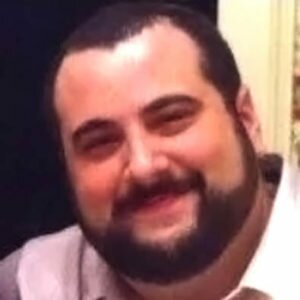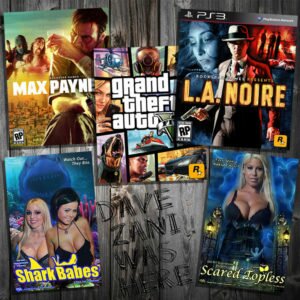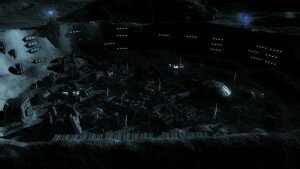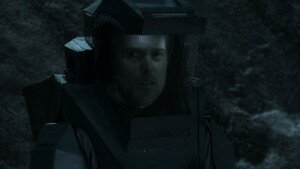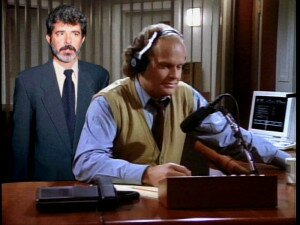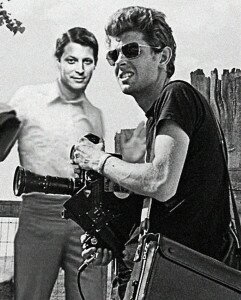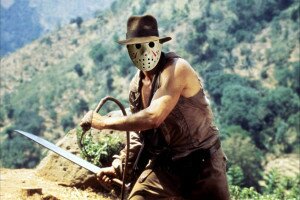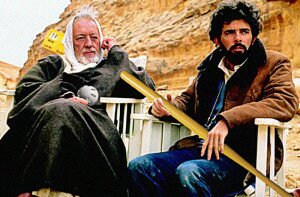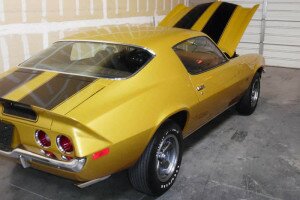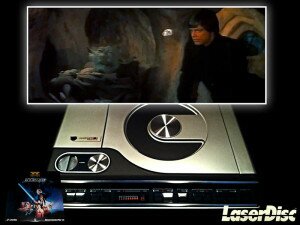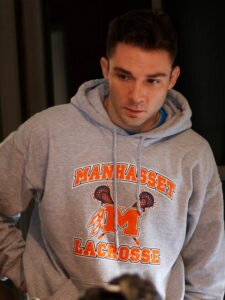
Ryan Colucci (seen here on set behind the camera) didn’t originally account on being in the film industry but when he crunched the numbers he knew it was his destiny. (He was almost an accountant.)
The Daily Quarterly: What made you want to be in show business?
Ryan Colucci: First and foremost, I love the idea that someone can create a world… And other people can take a trip inside that world. I have always wanted to tell stories, I’m not the type of person to regale a room with a tale. I am rather introverted. So, writing/drawing was something I was drawn to as a child because it scratched that itch and was solitary (I was fortunate to be good at sports or I would have been a pretty isolated kid).
Growing up I wanted to be a comic book artist. It felt like that was the best way to share the stories I wanted to tell. As I became a teenager, that desire morphed into telling stories with a much different canvas – film.
However, I come from a fairly blue-collar background in New York where a career in the arts was not realistic, so I went to Villanova University and studied accounting, for no other reason than it was supposedly hard and I was good at it. I spent a year overseas studying economics and political science at Cambridge University – and when I was there I realized I was destined for another life. It was the first time I left the bubble that was my life, and really took stock of it. The books I was consuming in large quantities all had one thing in common – they were about filmmaking. Not the racy, exciting side of Hollywood… but books on lighting and editing and screenwriting. It dawned on me that people actually do this for a living.
So I came back, transferred to film school close to home and eventually got accepted to the Peter Stark Producing MFA Program at USC.
I didn’t completely abandon the comic world though. I’ve put out two graphic novels. In fact, my book Harbor Moon makes a few cameos in Suburban Cowboy because the lead is obsessed with werewolves (shameless self-promotion).
TDQ: Who was your favorite director growing up?
RC: Growing up, I knew nothing about directors and writers and stars. Since I was a child of the 80s, Star Wars basically defined my childhood. So, I’d have to say George Lucas. I also have a really strong connection with the Savage Steve Holland movies of the 80s – Better Off Dead, One Crazy Summer and, less so, How I Got Into College. It wasn’t until high school I realized the same guy directed them all.
TDQ: What was your favorite movie growing up?
RC: “Rad.” It’s a BMX film from 1986 directed by one of the most legendary stuntmen/action directors – Hal Needham. There was a period of a few years in college where I supported my bar tabs bootlegging VHS copies. For those that weren’t alive back then, you didn’t hit record and it was done in a minute. You had to play the whole movie while another VHS deck (in this case multiple decks) recorded it. I never counted, but I have seen the film well over 500 times.
TDQ: What is the best advice you have ever gotten?
RC: Find the best script you can do for the absolute least amount of money – then go make it.
I have a lot of scripts… some that I know aren’t ready and some I love. After shopping each one, realizing the market was shrinking, I would write another that was smaller. Until I eventually wrote one that I could actually just go do on my own.
TDQ: What is the worst advice you have ever gotten?
RC: Sometimes you hear, ‘pick one project and put all of your energy into it.’ I’m not sure I can get behind that idea. I give each of my projects everything I can, but there’s only so much you can do yourself… and then what do you do? Just wait around hoping for a miracle? That never made sense to me. I’m like a shark, I need to constantly be moving forward. Maybe that has hurt me early on, but now I have so much going on and it is amazing.
TDQ: Who are your influences?
RC: I’m influenced in my writing by the people in my life. Luckily, I’m surrounded by colorful characters.
In life I’m influenced by the competitive drive of athletes; Michael Jordan, Larry Bird, Ronnie Lott, Royce Gracie and Gary Gait.
As a filmmaker, I’m influenced by every movie I see – good and bad. Sometimes it is more helpful to watch a handful of bad movies than one good one. That said, the two films that really inspired me to forge this career are Pi by Darren Aronofsky and Brothers McMullen by Ed Burns. These are two films that I saw and thought – films aren’t made in some fantasy land (Brothers McMullen was essentially made in my backyard on Long Island). I love these movies… and I think I can do this.
TDQ: Tell us about your latest movie, “Suburban Cowboy?”RC: The film is about Jay, a mid-level weed supplier on Long Island. One of his dealers, also his childhood best friend, robs someone to pay Jay back for his last shipment. His friend disappears and the debt is left to our hero – because the person who got robbed was connected to Serbian gangsters in Queens. He sets off to collect the money he has on the street, but when he comes up short Jay is forced to take drastic measures.
It’s a raw, visceral look into a world you live in but probably don’t want to know exists. The story isn’t groundbreaking, but what fascinates me about it is this idea that the guy next door is a criminal. It’s not this stereotypical gangster story where the bad guys are obviously criminals. It’s more true to life, at least in the part of the world I come from.
The person I was working with on the story was actually arrested as I finished the first draft of the script. I rewrote the ending to reflect what was happening in real life. Of course things change based on budget, locations and particularly cast, but the details/specifics of the world are hopefully what makes this unique.
TDQ: Besides directing, you also wrote and produced “Suburban Cowboy.” Does wearing that many hats on one project make it harder to easier for you in the process of getting it completed?
RC: I don’t know if it is easier, but it means I have more control. Since I’m obsessive about the things I’m working on, I also know I will get it done at the level I expect and plan for.
I love every part of the process. I got into filmmaking to make movies. Not to take lunches. Not to try and be cool in LA. Not to walk red carpets. Not to date actresses. I went to producing school and got my MFA from USC for three reasons; it’s the best film school in the world, they were crazy enough to let me in… and I knew that the way for me to become the best filmmaker possible was to understand the process from start to finish. And that meant script, financing, working with studios, etc…
“Suburban Cowboy” was the first project that I got to do exactly how I wanted – meeting every cast and crew member personally before bringing them on. And it turned into a fine-tuned set. In fact, we were so efficient that we only went into over-time on one day and were able to shave a day off our shoot schedule – on what was a micro-budget film, which is pretty rare. I need to give credit to the cast and crew though. Regardless of how many hats I wear, filmmaking is a group effort and I had some people working on the film at reduced rates out of sheer belief in me.
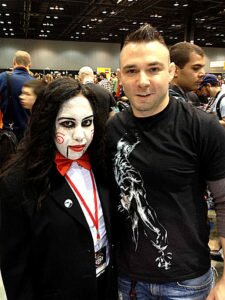
Ryan Colucci: Con man. You know, like comic convention. He has a background in graphic novels. He is starting an animation studio!
RC: I’m currently co-directing Orient City, a hand-drawn animated samurai spaghetti western with Zsombor Huszka (who did the animated titles for Suburban Cowboy). We just finished the short film, but dove right into the feature. I recently returned from a few months in Budapest laying out the storyboards.
Up next for me on the live action side is a contained sci-fi thriller called Andover, a project written by Dikran Ornekian and Rylend Grant. You never know what will happen in terms of financing, so I wanted a project that could be done at the same budget level as Suburban Cowboy, but with the ability to stretch that money further (limited locations, small cast). Those guys crushed the script and there is interest in doing it at what can best be described as a non-micro budget. At a certain budget level you lose your ability to take risks creatively and make something different, so we’ll see how fast it can come together. As nice as it would be to take a step up, I don’t want to be on the shelf that long.
TDQ: Where do you see yourself and your career in five years?
RC: On the set of Orient City, the live action version.
Seriously though, there are projects and avenues I want to pursue and I have a very definitive plan in terms of which projects I want to do in which order… but to a large degree that is out of my hands. I can only keep them in the back of my mind as I make decisions and move forward. I want to stay as active as possible, for as long as I’m physically able. We are essentially starting an animation studio, so the goal is to constantly go from one hand-drawn film to the next with Zsombor, while also pursuing live action features and television.
For all of that to happen people have to go watch Suburban Cowboy. It is currently available for rent/purchase digitally; iTunes, Amazon, Google Play, Xbox, Vudu, Dish, DirecTV, OnDemand (Time Warner or Comcast)… If it sounds at all interesting, give us a shot!
Be sure and follow Ryan on and check out his website.


